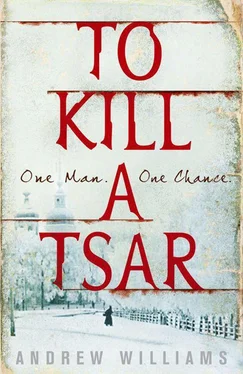On his knees, spoon in hand: ‘Where is Anna?’
He heard his question passed down the pipe by his neighbour. Half an hour later there was a reply: ‘Here.’
Unable to contain his disappointment, he jumped to his feet, pacing, spinning in his tiny cell, struggling to hold in check an urge to shout, bellow, beat on the door. Oh God. What now? Trapped, helpless, there was nothing he could do but tell her he loved her too. Sinking back to his knees, he chinked it on the pipe, over, and over and over.
After that he fretted about Anna and their baby constantly, searching every few hours for an excuse to send her a message by the prison telegraph. But there was no reply. He lay for hours on his bed, churning the same fears over and over until he reached the pitch of misery beyond which only madness lay. Once he dreamt he passed invisible through his door on to the landing and was drawn by fairy tale light to her cell where, to his surprise, the ceiling seemed to dissolve into a starry night sky, and he bent beneath it to kiss her tenderly. But a door clanged shut on the landing below, resounding in the well and forcing him back to the complete darkness of his own cell.
The trial lasted only three days, the verdict never in doubt.
‘Were you a friend of Sophia Perovskaya’s, Doctor?’ One of the younger warders asked at breakfast one morning.
‘An acquaintance.’
‘They say she’s the only one who may escape. The emperor would have to confirm her sentence personally because she’s nobility.’
But the new tsar was not inclined to show clemency. No exceptions would be made for sex or birth and the sentences were confirmed on all five of the regicides. The news travelled along the pipes to every corner of the prison and, when everyone knew, there was silence. Even the warders seemed to step more lightly on the iron stairs. In his mind’s eye Hadfield could see Anna curled in misery, with thoughts of the ordeal her comrades must face, and his heart ached for her and with the fear that one day the same harsh justice might be meted out to her too. In desperation he sought the governor’s permission to write to his uncle and to the embassy. He would acknowledge his unborn child and request it be given the protection any British subject was entitled to. For a day he heard nothing. Then he received word the governor was seeking guidance. And, on the eve of the executions, a visit at last.
‘But who were you expecting, Doctor?’ asked Dobrshinsky. He paused for a few seconds, his eyebrows raised in a quizzical expression: ‘Your uncle again? You know, he has done you great service. Sit down, please.’
Hadfield did as he was bidden.
‘First let me apologise for Major Barclay’s behaviour. He was overwrought but that is not to excuse him. He was most ungentlemanly.’
‘Yes.’
‘I have just visited the condemned cells. You know the regicides are to be executed in the morning?’ The special investigator’s voice was reflective, his eyes fixed for a moment on the middle distance. There was the same sickly pallor in his cheeks, his skin drawn tighter across the bone.
‘Have you tried to imagine how you would behave if you were the condemned man?’ Again the curious cold tight-lipped smile. ‘Or woman?’
‘Is it possible to imagine?’
‘You are fortunate you will not have to try. But your friend Anna Petrovna…’ Dobrshinsky’s voice tailed off suggestively. ‘Of course, you know she is a prisoner here,’ he added. ‘Is it your child? I thought so.’
‘Has she seen a doctor?’ Hadfield asked, trying hard not to betray any emotion in his voice.
‘Would you like to examine her yourself?’
‘And the price for this act of humanity?’
Dobrshinsky winced and lifted a trembling hand to his temple as if to soothe a stab of pain.
‘The old problem?’
The special investigator frowned and dropped his hand behind his back. ‘I am quite well, thank you, Doctor. We are still in need of a little help — an address, two addresses actually. Vera Figner and the printing press.’
‘And you want me to ask Anna? I took you for a more astute fellow.’
‘You would need to tease it from her. Do you have any conception of what will happen to your baby if you don’t?’ And he explained that the infant would be taken from Anna and placed in a state orphanage with no name and no registered parents.
‘But the baby is mine and I am a British subject!’
‘I believe the state prosecutor will take the view that it is only possible to be certain of the baby’s mother.’
Hadfield rose angrily to lean across the table. ‘That is an ungentlemanly slur.’
‘You have become involved in an ungentlemanly business, Doctor,’ said Dobrshinsky coldly. ‘Your own conduct is hardly above reproach. I can help Anna Petrovna, but only if you can offer me some assistance. Believe me, I have no wish to condemn a child to misery before it is born but my hands are tied. Reflect, Doctor, I beg you. We will talk again.’
Hadfield spent a long night brooding upon the collegiate councillor’s words, grasping first the hope he was being bullied by an idle threat then slipping back into a pit of misery. In the early hours his thoughts turned to the vigil the condemned were keeping and he felt sure Anna would be watching through the night too. Close to dawn, he fell into an exhausted sleep, but was woken after only a short time by boots on the landing outside his cell. Before he could rise, the door opened and a warder stood before him, silhouetted against the gaslights on the wing: ‘Wake up, Doctor, we’ve a surprise for you.’
His head still thick with sleep, they bundled him out of the cell and down the iron stairs to the visiting room. His own clothes had been laid out on the table, still dusty, the sleeve of his coat torn in the scuffle with the gendarmes. He was ordered to dress quickly, and as soon as he had he was escorted to a closed prison carriage.
‘Where are you taking me?’
But they refused to answer.
It was early, perhaps seven o’clock, but to judge from the street noise, remarkably busy, and before long the carriage horses were obliged to slow to a fast walk. Above the rumble of the wheels he could hear the murmur of a great number of people, and he realised with a start that they were gathering for the executions. The driver began shouting for a passage, enlisting the support of the soldiers lining the route, but after only a few minutes they came to an abrupt and final halt. Even in the darkness, Hadfield was conscious of the huge crowd swelling round the carriage like the tide about a rock. The doors were flung open and for an instant he was blinded by spring sunshine. Curious faces turned towards him, excited whispers, and rising from the bench, his eyes were drawn across the sea of heads to the scaffold with five ropes hanging from its cross-beam. And as he gazed at it, he was gripped by the breathless fear he was to witness Anna’s death.
‘Why am I here?’
Again the gendarmes did not answer but pulled him roughly from the carriage and began leading him in a catatonic daze towards the platform. The parade ground had been churned by horses and the boots of thousands and, after a few steps, he stumbled, falling to one knee in a dirty puddle before being hauled back to his feet.
‘Why am I here?’ he asked again, making no effort to keep the desperation from his voice. ‘Please tell me.’
The older of the two gendarmes — a sergeant with a bold cavalry moustache — gave an unpleasant barking laugh. ‘Calm down. It’s not your day.’
‘Then why am I here?’
‘Orders,’ and that was all he would say.
He took in the scene as a series of disparate sounds and images only; green and gold uniforms, the cotton-wool sky and domes of the regimental cathedral, six black steps up to the platform, the humiliation posts with chains and manacles, and the red-bearded hangman with the five criminals who were to act as his assistants. In front of the foot guards about the platform was a seated area reserved for the privileged with tickets and police officials, and it was to here the gendarmes led him. A tall but slightly stooped figure in a German hat stepped forward to meet him. ‘You are in good time, Doctor.’
Читать дальше












